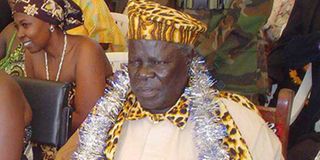Iteso King Emorimor is dead: Long live the interim leader

Teso King Papa Augustine Osuban Kadugala Lemukol.
Papa Augustine Osuban Kadugala Lemukol, the Emorimor or supreme cultural leader of the Iteso people in Uganda, Kenya and the diaspora, passed away earlier this week.
He is being accorded a state funeral in Uganda, complete with a parliamentary recognition, several viewings and services in major cities in the east of the country before his interment in the heart of Teso region.
Meanwhile, according to the Iteso Cultural Union (ICU) Mr Augustine Omare Okurut, the Emorimor’s Prime Minister, becomes the interim cultural leader or regent of the community.
To start on a light note, this is the story of three Augustines for me. Augustine is one of the names of the departed leader, and Augustine is the name of the incoming interim leader or regent.
Augustine is, or was, also my name, before my British teachers squeezed it into the “Austin” by which you know me. Apparently, we were all named after the fourth century saintly convert, scholar and churchman, Augustine of Hippo in North Africa.
Back to my Augustines, I did not personally know the Emorimor, although he was popular and well-loved among my own people around Entebbe, where he had a home. “Kadugala” (the Dark-Skinned One) was an endearing nickname given to him by the Baganda. The new man in charge, however, is an acquaintance and friend, so I will have to learn quickly how to behave around royalty.
Augustine Omare Okurut, the new man at the helm, is fully immersed in culture, by inclination, training and professional exposure. He is an alumnus of Namilyango College, the oldest boys’ boarding high school in the country, where I preceded him by some ten years.
When I caught up with him in the early 2000s, he was Commissioner for Culture in Uganda, and he invited me to work with his team on the formulation of Uganda’s Cultural Policy.
Iteso cultural institution
I kept interacting with him regularly when he was Secretary of Uganda’s UNESCO Commission. He actively supported us in our development of Uganda’s contribution to the formation of the East African Kiswahili Commission. I am sure he took to the Iteso cultural institution the same qualities of professionalism, devotion and imaginative leadership for which I have always admired him.
But my telling you about the Iteso and their Union is not only because of the news value of this period of transition in their leadership. Nor is it mainly because of my excitement at having a friend playing a major role in these affairs. My main purpose is to share with you the significance of the role of the Iteso and other “trans-border” communities in the forging and strengthening of our East African Unity.
It is well-known that African national borders, as we know them today, were arbitrarily drawn by European colonial predators in their scramble for power and resources on our continent. In the process, many communities and even families were split and divided by borders that often cut right through their territories. We all know the inconveniences caused by such borders to the ordinary members of these communities.
The Kenya-Uganda border, for example, runs across Teso settlements, with the majority of them in Uganda but with a significant section of them in Kenya. But they are not the only ones thus split along that border. You find Kalenjin people, Bamasaba, Basamia and Banyala on either side of the same border. The phenomenon is ubiquitous
Since our leaders agreed to keep our borders as they stood at independence, the members of those divided communities have depended on common sense and the goodwill of their leaders for their day-to-day interactions. This has worked well in most cases but maybe organs like cultural unions might heighten our sense of unity despite the colonial borders.
Memorable example
Such entities are not entirely new on the East African scene. A most memorable example from the past is the Luo Union of East Africa, originating in the 1920s but most conspicuous from the 1940s. Describing itself as a welfare organisation, it catered for Luo communities in Kenya, Tanganyika and Uganda.
The current organisations, however, like the Iteso Cultural Union, the Inzu ya Masaaba (House of Masaaba) among the people of the Mount Elgon region, are a new experiment in cultural engineering. Emphasising their totally non-political nature, they advocate and promote the “soft power” of culture (language, orature, custom, indigenous knowledge, art) in mobilising their members for development. They are, patently, an extension of Uganda’s experiment, after 1986, to restore the traditional cultural institutions, like the “Kabakaship” (kingdom) of Buganda, which had been abolished for decades.
A commonly raised arguments against the institutions is that they may revive and encourage the spectre of “tribalism”. This is not to be taken lightly. But ethnicity and ethnic identity is not the same as ethnicism or tribalism. It is fine to embrace and be proud of one’s identity, origins, language and customs.
But the tribalism comes in when and if such self-identification is used as an excuse for rejecting and discriminating against those who identify themselves differently. We are multi-ethnic and multi-cultural and pluralism and inclusivity, reciprocal understanding and acceptance, should be our operating principles.
Political processes
Another reservation is that these cultural institutions could be diverted or perverted for political purposes. This has happened in the past, as in Uganda, with disastrous consequences. But giving cultural institutions a chance to contribute to the development of our societies, without meddling in politics and constitutional governance, seems to be the calculated chance that our leaders are taking.
The challenge of the cultural institutions and their leaders is the clear understanding of the distinction between their role and the political processes, and adhering to that distinction. Papa Osuban Lemokol won credibility and respect in his role by observing that distinction through the two decades that he led his community. He has set a good precedent for his peers, which they will, hopefully, follow for the success of their communities.
May the Emorimor rest in peace.
Prof Bukenya is a leading East African scholar of English and literature. [email protected]





